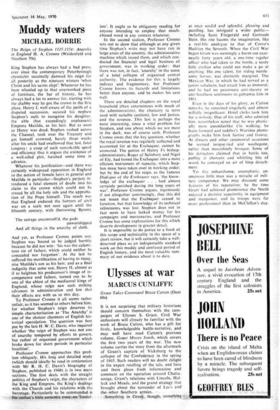Muddy waters
MICHAEL BORRIE
The Reign of Stephen 1135-1154: Anarchy in England H. A. Cronne (Weidenfeld and Nicolson 70s)
King Stephen has always had a bad press, ever since the contemporary Peterborough chronicler succinctly damned his reign for all posterity as the nineteen winters 'when Christ and his saints slept'. Whenever he has
been wheeled up to that overworked piece of furniture, the bar of history, he has always had a lot to answer for, starting with the shabby way he got the crown in the first place. Henry I, well aware of the perils of a disputed succession, secured his nephew Stephen's oath to recognise his daughter, the able (but exceedingly unpleasant) Empress Matilda, as his heir. But as soon as Henry was dead, Stephen rushed across the Channel, took over the Treasury and got himself crowned, barely three weeks after his uncle had swallowed that last, fatal lamprey: a coup of such remarkable speed
_ and efficiency that it argues the existence of a well-oiled plot, hatched some time in advance.
Whatever his justification—and there was certainly widespread opposition in England to the notion of female heirs in general and Matilda in particular—Stephen's perjury in- troduced a fatal element of doubt into his claim to the crown which could not be erased by all the holy oils and the approba- tion of the Pope himself. The result was that England endured the horrors of civil war on a scale not seen again until the fifteenth century, with (borrowing Byron), The satraps uncontroll'd, the gods unworshipped And all things in the anarchy of sloth.
And yet, as Professor Cronne points out, Stephen was bound to be judged harshly because he did not win: 'his was the calami- tous sin of failure, which could neither be concealed nor forgotten'. At the last he suffered the mortification of having to recog- nise Matilda's son as his heir; and as a final indignity that same son, Henry II, almost as if to heighten his predecessor's image of in- competence and failure, turned out to be one of the ablest of the mediaeval kings of England, whose reign saw such striking advances in administration and law that their effects are with us to this day.
To Professor Cronne it all seems rather unfair, as it has seemed to others before him; for whether Stephen's reign deserves its simple characterisation as 'The Anarchy' is one of the choicer chestnuts of English his- torical speculation. The question was best put by the late H. W. C. Davis, who inquired whether 'the reign of Stephen was not one of anarchy tempered by efforts to govern, but rather of organised government which broke down for short periods in particular localities'.
Professor Cronne approaches this prob- lem obliquely. His long and detailed study (which should ideally be read in conjunction with Mr R. H. C. Davis's biography of Stephen, published in 1968) is in two main sections. The first deals with the straight politics of Stephen's reign, the characters of the King and Empress, the King's dealings with the Church and his relations with the baronage. Particularly to be commended is the,author's little semantic essay-on 'feudal- ism'. It ought to be obligatory reading for anyone intending to employ that much- abused word in any context whatever.
In the second section, Professor Cronne sets out to show that although at any given time Stephen's writs may not have run in large areas of the country, the administrative machine which issued them, and which con- ducted the financial and legal business of government, was in working order: that there was not, in fact, 'anarchy' in the sense of a total collapse of organised central authority. The evidence for this is largely indirect and fragmentary, but Professor' Cronne knows its hazards and limitations better than anyone, and he makes his case well.
There are detailed chapters on the royal household (then coterminous with much of the administration), the chancery (a term used with suitable caution), law and justice, and the revenue. This last is perhaps the most interesting, since a vital problem for Stephen, and one about which we are most in the dark, was of course cash. Professor Cronne owns that the key Question, whether the royal revenue was regularly collected and accounted for at the Exchequer, cannot be answered. The genius of Henry l's bishop- administrators, Roger of Salisbury and Nigel of Ely, had honed the Exchequer into a most efficient instrument of rapacity, which Step- hen must have taken over in working order; but by the end of his reign, as the famous Dialogue of the Exchequer says, 'the know- ledge of the exchequer . . . had almost certainly perished during the long years of war'. Professor Cronne argues, ingeniously if not altogether convincingly, that this did not mean that the Exchequer ceased to function, but that knowledge of its technical refinements was lost. Stephen does not in fact seem to have lacked money for his campaigns and mercenaries, and Professor Cronne has some explanations for this which deserve development in greater detail.
It is impossible to do justice to a book of this scope and technicality in the space of a short review, but it will certainly take a well- deserved place as an indispensable standard work on this muddy and confused period of English history, and the most valuable sum- mary of our evidence about it to date.


































 Previous page
Previous page